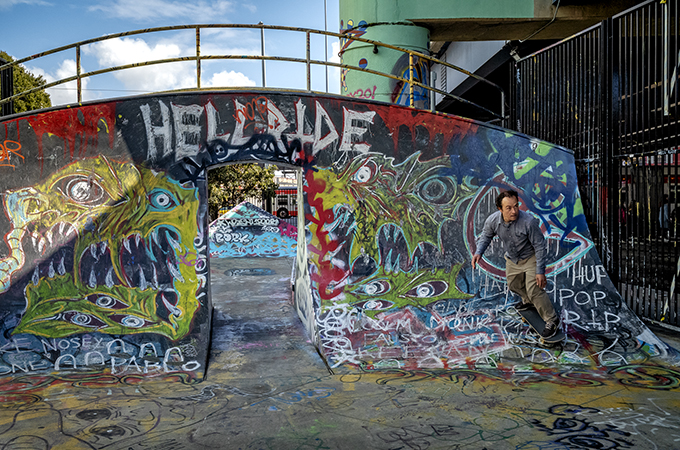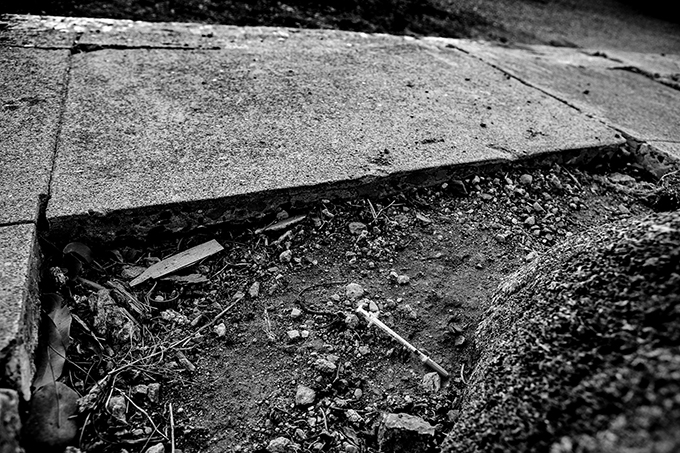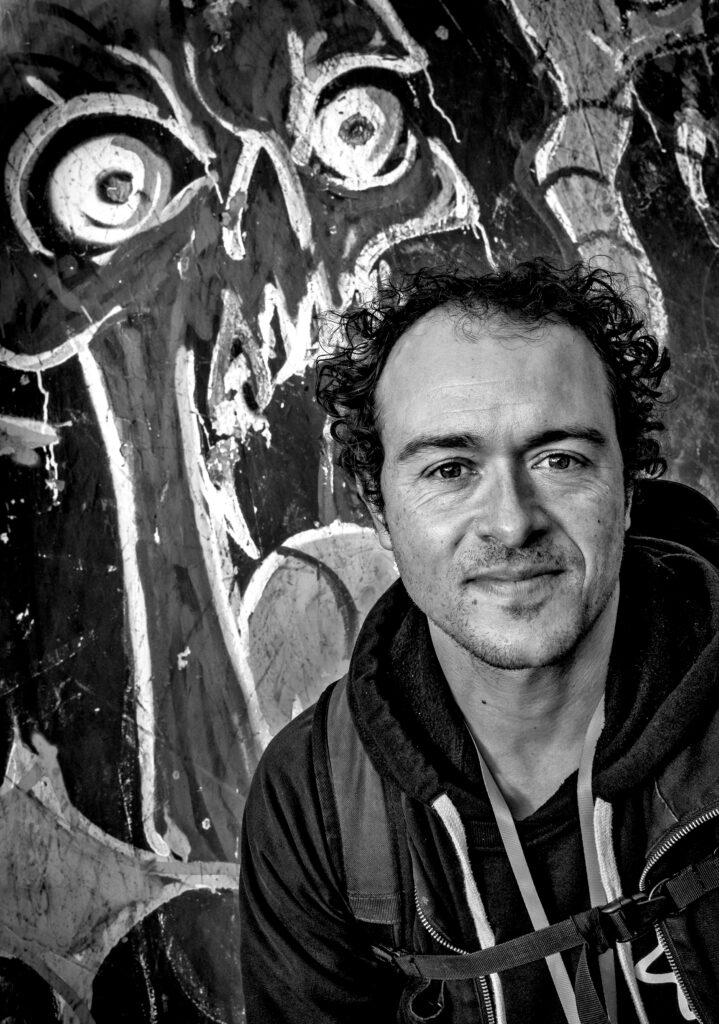Workers on Work: Clinical social worker and therapist
By Joe Sciarrillo
From time to time the Stansbury Forum will post workers talking about their jobs. Today’s post is by Joe Sciarrillo, a licensed clinical social worker and therapist. He works outreach with the unhoused and addicts in San Francisco, California.
.
I’ve been a social worker for about 9 years now. I’ve always wanted to be a social worker. I grew up in a family that was very influenced by Jesuits, and I got involved in the progressive side of the Catholic Worker, service orientated, the more liberal side of the Catholic Church. I had some teachers at my Jesuit school who were activists in the Tenderloin and that really influenced me to do something that addressed the inequality on the street.
Social work is great. It lets you have a therapist’s hat, but it also lets you get involved in the systems, connecting the dots among all the agencies that are supposed to be serving people.
I work with people who are mostly unhoused in the Tenderloin, Mission, Bayview, and SOMA neighborhoods. Mostly (I) do therapy on the street with people who are unhoused, and a little bit of case management: connecting people to housing, to doctors, to therapy, to job programs.
◊
Our organization’s motto is, “Come as you are”, so therapy on the street involves letting people approach you with whatever issues they’re going through, being non-judgmental and willing to listen. That often involves being attentive to someone’s trauma, possibly their depression, and anxiety. Being able to listen with compassion, affirm people’s identity, what they’re going through, and provide emotional support and encouragement, as well as to support people to make whatever next steps they need to make.
For me the most frustrating thing is knowing that in a city like San Francisco there are thousands of people who are in dire straits, and me talking to someone can be a positive interaction. But there is so much more support the city needs to provide. The city needs to do a better job of providing access to housing, access to medical care. The most frustrating thing is feeling like I’m just a band aide amidst many gapping wounds. There needs to be a lot more services, medical and housing, addressing the economic system that doesn’t fit for everyone.
◊
The common issue is someone having past trauma. Whether that being the jail system, being in foster care, a traumatic divorce, or an accident, and not having enough of a safety net, or support, to cope. Or being very isolated and struggling and that leading to depression. But all that is sparked by a trauma. They’re struggling to figure out how to heal.
It’s very common, but not always the case, for people to be using drugs as a way of coping.
◊
[Do you take all this home with you?] My wife would say yes. I would say I’ve always had these social injustices in the front of my mind, since I was a kid.
I think that by being involved in the work, being face to face with the issues, I’m able to compartmentalize it a lot more than when I wasn’t a social worker. I feel like I am able to do my self-care when I get home – go skateboarding, watch movies, watch music – and I can decompress. But I always need to talk to someone about what I’ve gone through throughout the day.
It was worse when I wasn’t doing this work, when I was just a student I would be consumed by reading the news and theoretical things about society and injustices. I was emotionally a lot more wound up in being frustrated back then than I am now.
◊
I’ve only formally been a social worker for 9 years. Before that, for 20 years, I was either a paralegal or a caseworker. I would say all of that was social work without the name. So, I’ve been doing it for over 20 years because it’s just ingrained in how I see the world.
It gives meaning to my life by feeling like I am a factor in trying to create positive change in society, or some individual’s life. And it’s reciprocal. I take meaning out of it, and I hopefully give meaning to someone, as well. That’s how I see the world.
It makes life so much more meaningful if we are there for each other. If we’re able to do that for our 9-5 job, that’s so much greater. So, I intend to do something like this for the rest of my life, if I can.
◊
I would just say that when people like me say the city should do more, I’m saying city agencies should do more, but also individuals, as well.
I think if more people saw people on the street as their neighbors, that would have a ripple effect how the average person interacts with someone on the street, even if it just means looking people in the eye and saying hi. That can have a ripple effect into what type of policies we vote for, how we put pressure on our supervisors, and city departments, to implement more humane programs.
As far as what needs to be addressed, the list could go on: affordable housing, more protections against evictions, more access to pro bono attorneys for tenants’ rights.
There needs to be more green spaces, more safe spaces for people to nap on the streets. More access to healthy food – not just soup kitchens – but more affordable healthy food. It’s been good to see more water fountains open.
There needs to be more public toilets, not just for the unhoused but for everyone who’s out and about during the day.
There needs to be safe injections sites. There are 700 people dying of overdoses a year and we just keep sweeping that fact under the rug. It’s not going to go away unless there is more of a safe community to support people as they go through their addiction.
We know even if they want to, they can’t quit right away. We need more crisis response teams, not just during the day but overnight.
Yeah the list can go on.
◊
About addiction, I never realized, up until this last year, how addiction can be so inexplicably difficult to step out of. I’ve been able to meet people that have gone through rehab programs – AA or inpatient treatment – that maybe worked for them for a few weeks, a few months, but didn’t work for them in the long-term sense. That opened my eyes because I always assumed that doing one or two rehab stints could be a long-term solution. But I’ve learned how complicated and nuanced addiction is.
There are so many variables to treating addiction that we have to have an open mind to harm reduction programs, [but] also to those more traditional programs that do work for some people. Addiction isn’t a one size fits all.
I have a lot more patience now with listening to different approaches to addressing addiction. I’m more humble about addressing it and talking about it, than I used to be.
◊
I think the biggest tool and skill is compassion, that’s the foundation when I’m encountering whatever traumas, or whatever social ills, injustices, sufferings people are going through.
Having my grounding in figuring out and believing that we are all connected. That we all have a purpose to help each other, to support each other, and that all comes from values that I’ve grown up with.
Listening! I think listening is a tool that is not talked about very much. Being able to be fully present with someone and listen more than you talk.
Compassion can be an issue when it connects to the issue of boundaries.
I’ve struggled with working overtime, and that bleeds into my family time, or people learning more about my personal life than they need to. And me sharing too much.
You have to balance the compassion with some type of self-care.
…






